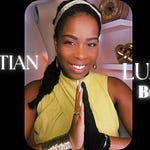By Liselle Kiss of The Liselle Club New York
Why hello, loved ones. Welcome, Mavens, to The Intellectual Refuge. Today, I want to share a reflection that unexpectedly unfolded as I opened my Bible app—something I do each morning before I open any other app. I had no plan or agenda—just the Word, my heart, and a bit of curiosity.
You see, once upon a time, I studied French. I learned it for fashion, and I even spoke with a French scientist en français. But somewhere between Paris, Nice (yes, Nice is nice—pun intended!), and fashion networking events, I let that language slip away. Yet here I am, diving into the one language that always stays fresh in my heart: the language of Scripture.
Today’s reflection took me to 2 Samuel 24—a passage that might at first seem heavy, but if you look closer, you’ll glimpse God’s mercy, David’s heart, and a profound lesson for every entrepreneur, artist, or giver who has ever hesitated to ask for their worth.
When God Himself Offered David Three Choices
David made a misstep: he ordered a census of Israel, something God hadn’t asked of him. His commander questioned him, but David insisted. The result? God, in His justice, offered David a choice of judgment:
1️⃣ Three years of famine
2️⃣ Three months of fleeing from enemies
3️⃣ Three days of plague
David chose the plague, placing his people in God’s merciful hands. Tragically, 70,000 lives were lost. But here’s where the story shifts from judgment to grace.
The Angel, The Threshing Floor, and The Heart of Exchange
At the height of the plague, an angel of the Lord stood over Jerusalem, ready to strike. But God said, “Enough! Withdraw your hand.” God’s sorrow over the suffering is striking. Even in judgment, His heart aches for His people.
David, seeing this, pleaded: “Let your hand fall on me and my family; these people are but sheep. They’ve done no wrong.”
And then came the remedy: through the prophet Gad, God instructed David to build an altar on the threshing floor of Araunah the Jebusite—the very place where the angel had stopped.
The Gift That Cost Something
Araunah, seeing his king approach, offered the land, the oxen, the wood—everything—for free. But David’s reply was breathtaking:
“No. I insist on paying you for it. I will not offer to the Lord my God burnt offerings that cost me nothing.”
Let that sink in. Even as king, even in crisis, David chose to pay for what he would give to God. He knew that true sacrifice involves cost.
And with that offering, the plague ceased.
What This Means for Us, Mavens
In a world where we sometimes feel awkward asking for payment, where we’re tempted to give endlessly without return, David’s example is a reminder: exchange is honorable.
Whether you’re setting a price for your work, accepting a gift, or investing in your calling—know this: God values offerings that cost something. Transactions, when done with integrity, reflect the design of a just and ordered world.
A Reflection for Your Journey
💫 Your worth is your worth.
💫 It is good and right to transact, to receive as well as give.
💫 When we sacrifice in ways that cost us, our offerings carry deeper meaning.
God could have created a world without money, without exchange. But He chose otherwise. Perhaps to teach us the beauty of balance, of giving and receiving.
Let’s Wonder Together
Do you think in paradise there will still be exchange? Will we transact in some form? I’d love to hear your thoughts—leave a comment below.
Until next time, Mavens. Thank you for sharing this intellectual refuge with me today. 💖
👉 If this touched your heart, consider subscribing or sharing this with someone who needs a reminder of their worth.







